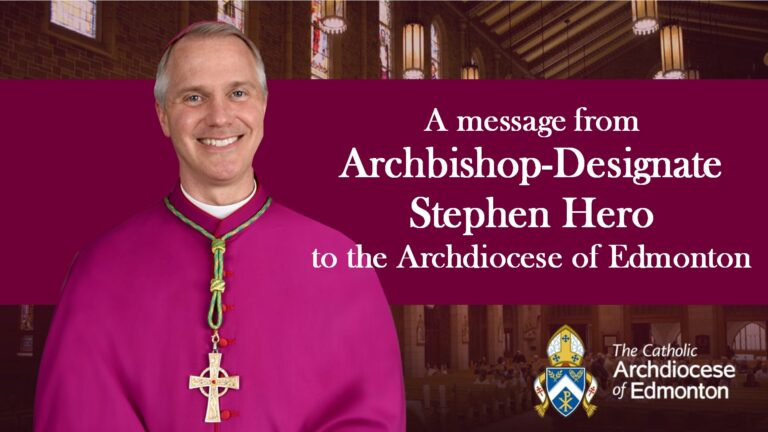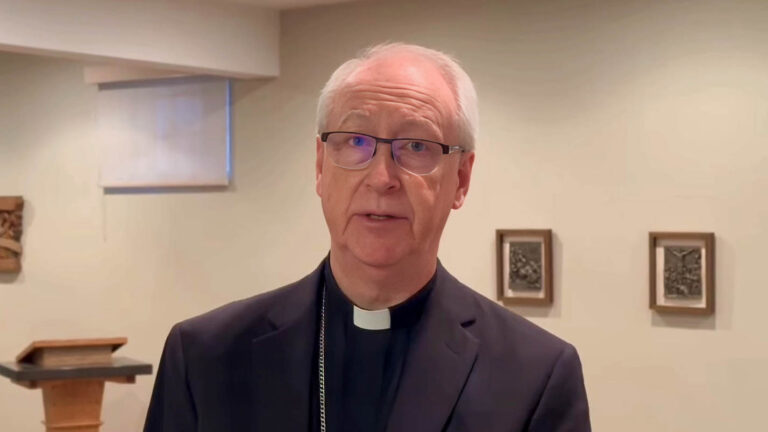Homily
[Daniel 12:1-3; Psalm 16; Hebrews 10:11-14, 18; Mark 13:24-32]
As our liturgical year draws to a close (the final mass of the year is next Sunday), the texts from the Book of Daniel and the Gospel of Luke direct our attention to another end time – the termination of history when Jesus will come again as he promised. Typically, Scripture will speak of sufferings and tribulations that will portend the Lord’s advent. This apocalyptic literature is notoriously challenging to interpret.
For our purposes this morning, let’s simply observe that the terrifying events are foretold as the immediate prelude to a decisive and saving intervention of God – His final victory over all that is evil and the definitive establishment of His kingdom.
Here is why this is important for us to see and grasp, we who are stewards of Catholic education. We do not need to wait until the end of the world to experience terrifying events and painful tribulations. They happen now both within and around us. Our beloved students are not immune to this.
Teachers see daily the impact on the young people’s lives of trouble at home, problems with homework, the malevolent influence of social media, the heavy weight of age-inappropriate questions they are not equipped to bear, and so on. That impact is persistent stress and deep anxiety. For us and for our students, these realities, too, are a prelude to the Lord’s victorious intervention if we face them with full faith in the love of our God. When we give all over to the Lord Jesus, he will step in, transform our lot, and turn what is painful or worrying to our good.
Leading our students to this faith is the responsibility entrusted to us as stewards of Catholic education. In the light of today’s Gospel text, an important way we exercise that stewardship is through vigilance. Jesus foretells the tribulations as the prelude to his coming, and then calls us to this attentiveness, to be on the watch, stay alert, remain awake, so that we do not miss the signs of his presence.
Many things today make us sleepy, and I am not talking about the seemingly endless marathon of meetings happening these days, or of this homily. Consider what we experience: the incessant pressure of timelines; our multi-faceted interactions with government, parents, and media; worry over schools with too many students or too few; concern with budget constraints, and so on. This steady droning of anxious busyness can easily lull us into missing the presence of Jesus, who can lift and transform our cares by merely speaking a word. Most importantly, it can lead us to miss opportunities to assure our young students, who often carry burdens far heavier than our own.
We have to stay awake and alert to the presence of Christ, because our students need to hear from us, they need to learn from our own example of liberating faith, that they can turn to our Lord Jesus, who is always vigilant, always “awake” to their every need, and who will always respond to those who cry out to him in their moment of distress.
Let’s keep all this in mind now as we approach the Eucharist. What tribulations are we enduring right now, personally or in our families? What students, teachers, or colleagues are we worried about?
At mass we bring all of this to the altar, where the power of the death and resurrection of Jesus is communicated to us. His is an unlimited power. As Hebrews puts it, his once-and-for-all offering of himself on the Cross is all-sufficient for all people of all time.
That is the power of God’s love, which can overcome all things. So, let’s not hesitate in the least to give our tribulations to him, full of faith that he will turn them into a prelude for his decisive and loving intervention in our lives and in those of our students.
✠ Most Reverend Richard W. Smith
Archbishop of Edmonton
Interim Liaison Bishop for Catholic Education in Alberta, the Northwest Territories, and the Yukon



